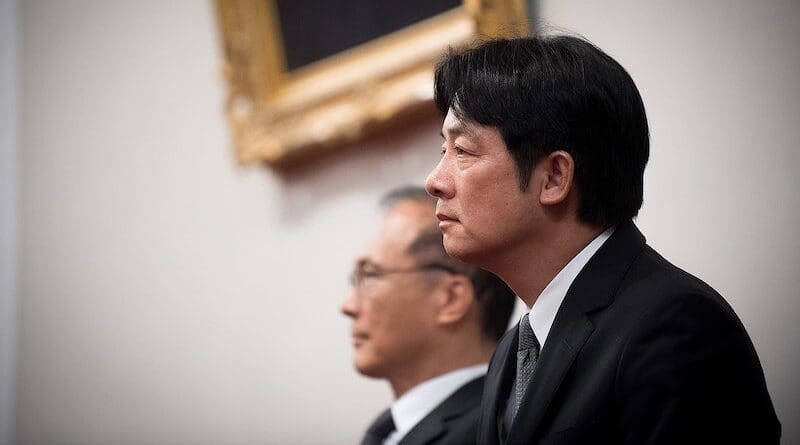The Meaning Of A Third DPP Presidency In Taiwan – Analysis
By IPCS
By Dr. Sandip Kumar Mishra
Taiwan’s Democratic Progressive Party (DPP) candidate Lai Ching-te’s win in the recently held presidential elections in Taiwan is indeed historic. This is the third consecutive victory of a DPP candidate in a presidential election.
The DPP was formed in 1986, and the first party candidate to be elected as president of Taiwan was Chen Shui-bian in 2000. Barring the eight years (2008-2016) of former President Ma Ying-jeou of the Kuomintang (KMT), the DPP has held the presidential position for 23 years. In fact, it appears set to do so not only for the coming four years but even beyond.
The DPP has become an important force in Taiwan’s political landscape and decisively broken KMT’s dominance in Taiwanese politics. The KMT has a history of more than a hundred years; it was the most prominent actor in Taiwanese politics since the Republic of China was founded, and until 2000. The DPP was born through the Tangwai movement, which opposed the KMT’s authoritarian, one-party rule, and sought more democracy and freedom in the country. Many DPP leaders have been educated in western countries and aspire to make Taiwan a truly liberal, democratic country. At the beginning, DPP was more overt in its support for Taiwanese independence and thus had a contrasting position to the KMT. Gradually, however, the party has become more pragmatic. Rather than talking about independence, it focuses on maintaining the status quo, which is as good as independence in all practical terms.
The DPP’s growing strength is basically indicative of greater awareness of the looming China threat among the Taiwanese public. They believe that it is better to contest Chinese pressure than succumb to it. The KMT, on the other hand, emphasises that a ‘well-behaved’ Taiwan wouldn’t face Chinese threats of forceful unification. The Taiwanese people, however, are more convinced that China believes in the “historical inevitability” of unification—and no ‘good behaviour’ is going to change China’s perspective. Prevailing public opinion thus is that irrespective of behaviour, China will try to unify Taiwan at the earliest opportune time. They view the way forward as a Taiwanese approach that relies on strengthening military capabilities, broadening diplomatic outreach, and creating more substance in alliances and friendships with the US, Japan, India, and others, rather than being circumspect in its struggle against Chinese adventurism. The Taiwanese see the DPP as more aligned with this approach.
China’s growing assertiveness under President Xi Jinping is obvious to Taiwanese people. They took note of the 2020 National Security Law for Hong Kong, which made clear that China has little respect for the principle of ‘one country, two systems’. More recently, China’s negative reaction to US House Speaker Nancy Pelosi’s visit to Taipei in August 2022 was also evident of Beijing’s thinking on Taiwan. In the past year and a half, China has held two rounds of extensive war games near Taiwan, and Chinese jets have crossed the median line between China and Taiwan more frequently. Several Chinese balloons and drones have also moved into Taiwanese air space. All of these developments have made the DPP position’s stronger.
The economic repercussions of the contestation with China are also apparent to Taiwanese public and the DPP. In 2023, Taiwan’s economic growth rate was just 1.4 per cent. Disruptions to economic exchanges with China would create further challenges. Taiwan’s trade with China was around US$ 224 billion in 2023; overall, it accounts for one-fourth of all external trade. Taiwan, however, appears to be optimistic about separating this economic relationship from their political contestation. It is also hopeful that the strategy of diversifying economic relations would enable it to overcome difficulties. Taipei has sought to diversify through various efforts, such as the New Southbound Policy (NSP) that was articulated in 2016. In 2022, due to these efforts, Taiwan’s total investments in the countries covered by the NSP surpassed investments in China for the first time. Reports also suggest that the number of Taiwanese working in China has been steadily declining since 2014.
While the DPP victory is historic, it clearly also faces challenges. It seems, however, that the Taiwanese people—and not just the party and its leadership—have decided to take these challenges head on.
- About the author: Dr. Sandip Kumar Mishra is Associate Professor, Centre for East Asian Studies, SIS, JNU, & Distinguished Fellow, IPCS.
- Source: This article was published by IPCS

